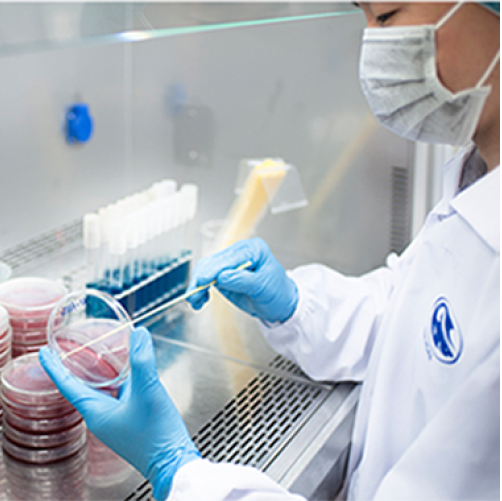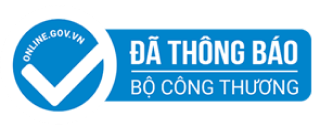
In our farm, we maintain our own Research and Development laboratory, where we are constantly examining ways to make aquaculture practices more market-focused, efficient and sustainable.
The industry has developed continuously and Vinh Hoan now has the knowledge and technology necessary to run large-scale commercial aquaculture operations in a manner that is both environmentally and economically sustainable. Our parent company, Vinh Hoan, is the world’s largest producer of Pangasius and was the first such producer to receive BAP 4-Star, and ASC certification.
Today, we work closely with several fish farmers to promote and ensure aquaculture practices are compatible with international standards for product quality and safety.


In order to increasingly affirm the position of the sustainable aquaculture industry in the world, we always aim to research and develop innovative science and technology applied to farming activities. We educate and train on-site to impart knowledge, technical skills, and company values with farmers in four core areas: Stock, Feed, Pond Management, and Systems.
Today, aquaculture already provides over half the world’s seafood. This is often cited as the only sustainable means of increasing the fish supply to meet the food needs of the world’s growing population. However, parallel to the growth goal is the challenge of sustainable development.
We believe that the way we manage environmental sustainability at the farming level impacts all the way up the value chain and impacts the future for all.
Our farming is committed to our ability to increase the productivity of food and wellness products in a manner that is both sustainable and profitable. Through our innovative practices, we are working to set benchmarks for ensuring the responsible development of the aquaculture industry as a whole. Done right our aquaculture practices create jobs, stimulate local economies, provide food and other fish-based health-related consumer products with a light carbon footprint.
Since 2008, Vinh Hoan successfully built the “Green Farm” program, playing a key role in fostering conditions for the well-known international certifications to Pangasius farming that we have today. Day by day, we witness the aquaculture’s ability in providing bountiful food and innovative wellness products sustainably and profitably.
Our farming practice works to ensure that the aquaculture industry is developed in a responsible manner. Our distinguishing features focus upon environmental sustainability, social and community sustainability and economic sustainability. Some of our essential practices include:
Environment practices:
• The Government’s environmental regulations: the farm must acquire all licenses and permits as required by law relating to farming activities. Wastewater must be rigorously treated according to industry regulations. Further, it is required that full assessment of the environmental impacts must be conducted by independent third parties and measures must be taken to minimize environmental impacts caused by production activities;
• No impact on the biodiversity of the ecosystem surrounding farming areas: we specifically prevent the fish from escaping to avoid threats to the survival of other aquatic animals, to not kill wildlife in the conservation list, and to not destroy the important flora in the region;
• Feeding standard: we aim to use only feed made from responsibly produced sources and support the initiatives replacing fish meal with plants protein;
Community practices:
• Establish well-defined rights, aquaculture zones and responsibilities for aquaculturists; regulatory compliance and effective enforcement; community involvement; worker safety, fair labor practices and equitable compensation.
Sustainable business and farm management practices:
• Energy-saving policies for factories and farms: all facilities must consume energy in an economical and efficient method;
• Traceability system: fully traceable records are maintained from brood stock to harvest with all controlled factors including fish health, feed and other inputs;
Today, aquaculture already provides over half the world’s seafood. This is often cited as the only sustainable means of increasing the fish supply to meet the food needs of the world’s growing population. However, parallel to the growth goal is the challenge of sustainable development.
We believe that the way we manage environmental sustainability at the farming level impacts all the way up the value chain and impacts the future for all.
Vinh Aquaculture, a division of Vinh Hoan, is committed to our ability to increase the productivity of food and wellness products in a manner that is both sustainable and profitable. Through our innovative practices, we are working to set benchmarks for ensuring the responsible development of the aquaculture industry as a whole. Done right our aquaculture practices create jobs, stimulate local economies, provide food and other fish-based health-related consumer products with a light carbon footprint.
Since 2008, Vinh Hoan successfully built the “Green Farm” program, playing a key role in fostering conditions for the well-known international certifications to Pangasius farming that we have today. Day by day, we witness the aquaculture’s ability in providing bountiful food and innovative wellness products sustainably and profitably.
Vinh Aquaculture works to ensure that the aquaculture industry is developed in a responsible manner. Our distinguishing features focus upon environmental sustainability, social and community sustainability and economic sustainability. Some of our essential practices include:
Environment practices:
• The Government’s environmental regulations: the farm must acquire all licenses and permits as required by law relating to farming activities. Wastewater must be rigorously treated according to industry regulations. Further, it is required that full assessment of the environmental impacts must be conducted by independent third parties and measures must be taken to minimize environmental impacts caused by production activities;
• No impact on the biodiversity of the ecosystem surrounding farming areas: we specifically prevent the fish from escaping to avoid threats to the survival of other aquatic animals, to not kill wildlife in the conservation list, and to not destroy the important flora in the region;
• Feeding standard: we aim to use only feed made from responsibly produced sources and support the initiatives replacing fish meal with plants protein;
Community practices:
• Establish well-defined rights, aquaculture zones and responsibilities for aquaculturists; regulatory compliance and effective enforcement; community involvement; worker safety, fair labor practices and equitable compensation.
Sustainable business and farm management practices:
• Energy-saving policies for factories and farms: all facilities must consume energy in an economical and efficient method;
• Traceability system: fully traceable records are maintained from brood stock to harvest with all controlled factors including fish health, feed and other inputs;
Vinh Hoan restlessly explores ways in which sustainability can drive innovation in aquaculture. We are at the forefront of breakthroughs:


© Copyright 2021 Vinh Hoan Corporation. All rights reserved.